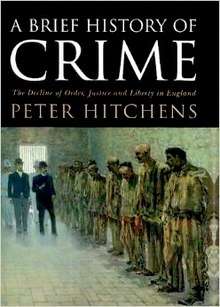A Brief History of Crime
A Brief History of Crime is the third book by author and journalist Peter Hitchens. Originally published in 2003, it was reissued in 2004 under the new title The Abolition of Liberty. The book was described in 2012 by The American Conservative magazine as "a must-read for anyone on either side of the Atlantic".[1]
 | |
| Author | Peter Hitchens |
|---|---|
| Country | United Kingdom |
| Language | English |
| Subject | Crime, Capital punishment in the United Kingdom |
| Publisher | Atlantic Books |
Publication date | 10 April 2003 |
| Pages | 320 |
| ISBN | 1-84354-148-3 |
| Preceded by | Monday Morning Blues |
Themes
The book challenges a number of commonly held views about the causes of crime, criticising the opinion that crime is caused by poverty or other forms of social deprivation. It also charts the changes in policing from the 1960s to the present day, and examines and criticises the workings of the modern British prison system, including a chapter on the author's visit to Wormwood Scrubs. Hitchens contends that the former principle of "due punishment of responsible persons" has been abandoned in favour of vague modern theories of rehabilitation.
Reception
Left-leaning publications were very critical of the book. David Rose in The Observer described the book as "a churning, ceaseless rant, akin to the wake of a cross-Channel ferry. It has similar bilious effects" and questioned whether the desperate situation described by Hitchens really exists, citing Oxford as an example.[2]
Conservative newspapers assessed the book more favourably. Bryan Appleyard, writing in The Sunday Times, described it as "a marvellous, angry polemic" that accounts for and charts how the British Police force became so "institutionally bureaucratic, sullen, chippy and ineffectual".[3] In The Sunday Telegraph, Theodore Dalrymple agreed with the main arguments in the book, writing "Mr Hitchens places the blame firmly where it belongs: on a supine and pusillanimous political establishment that, for four decades at least, has constantly retreated before the verbal onslaught of liberal intellectuals whose weapons have been mockery allied to sentimental guilt about their prosperous and comfortable lives, and whose aim has been to liberate themselves from personally irksome moral constraints, without regard to the consequences for those less favourably placed in society".[4]
Publishing history
The book was published by Atlantic Books, (ISBN 1-84354-148-3) in 2003. An updated edition, re-titled The Abolition of Liberty: The Decline of Order and Justice in England (ISBN 1-84354-149-1) and featuring a new chapter on identity cards ("Your papers, please"), and with two chapters – on gun control ("Out of the barrel of a gun") and capital punishment ("Cruel and unusual") – removed, appeared in April 2004. Hitchens explained in his weblog in 2010 that the reason for removing the above chapters was so that the book "would be read more widely".[5] Hitchens wrote in 2012 that the chapter 'Out of the Barrel of a Gun’ "enraged so many people that I took it out of the paperback version ‘The Abolition of Liberty’ in the vain hope that the book would then get the attention it deserved. A silly delusion. I now wish I hadn't".[6] The deleted chapters are restored in the audiobook.
Pun in title
The title of the original edition is a play on Stephen Hawking's A Brief History of Time. This began a habit for Hitchens' book titles to play on those of prominent atheists; for example The Broken Compass is a play on The Golden Compass by Philip Pullman, and its revised edition The Cameron Delusion is a play on The God Delusion by Richard Dawkins.
Bibliography
- Hitchens, Peter (2003). A Brief History of Crime (First hardcover ed.). London: Atlantic. ISBN 1-84354-148-3.
- Hitchens, Peter (2004). The Abolition of Liberty: The Decline of Order and Justice in England (Revised paperback ed.). London: Atlantic. ISBN 1843541491.
References
- Feeney, Matthew (9 April 2012). "Peter Hitchens, a Possible Member of Parliament?". The American Conservative. Retrieved 2 May 2012.
- David Rose (13 April 2003). "Hanging's too good for 'em". The Observer. Retrieved 22 April 2010.
- Bryan Appleyard (20 April 2003). "Review: Society: A Brief History of Crime by Peter Hitchens". The Times. Retrieved 22 April 2010.
- Theodore Dalrymple (13 April 2003). "The victims of liberalism". The Sunday Telegraph. Retrieved 22 April 2010.
- Peter Hitchens (5 July 2010). "Pride and Prejudice". The Mail on Sunday. Retrieved 5 July 2010.
- Hitchens, Peter (25 July 2012). "Cowardice, Words, Drugs, Guns and Reason". mailonsunday.co.uk. Retrieved 26 July 2012.
External links
- What's the point of prison Article by the author which discusses themes raised in Brief History of Crime